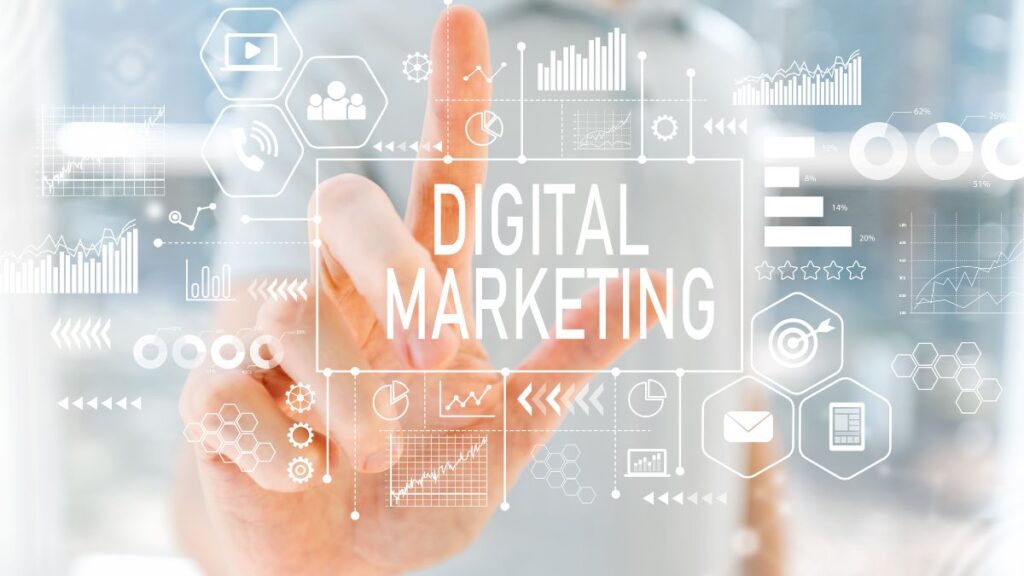Digital marketing is a fast-paced and ever-changing field that requires constant adaptation and innovation. As technology advances and consumer behavior evolves, digital marketers need to stay on top of the latest trends and developments to create effective and engaging campaigns. In this article, we will explore the future of digital marketing and the trends that are expected to dominate in 2024. We’ll also discuss strategies for optimizing your website and content to maintain high search rankings.
The Continued Rise of Artificial Intelligence (AI)
Artificial intelligence is not a new concept in digital marketing, but its importance continues to grow. AI is transforming the way businesses engage with their audience, personalize marketing messages, and automate routine tasks. As we move into 2024, we can expect AI to play an even more significant role in shaping the future of digital marketing.
AI-driven personalization, based on real-time data, will allow businesses to tailor their marketing messages to individual consumer preferences. The result? Increased customer satisfaction and enhanced brand awareness.
AI Digital Marketing Benefits
Content Creation
AI can help marketers create high-quality, relevant, and engaging content for their websites and social media platforms using natural language generation (NLG) and computer vision techniques. For example, AI can write blog posts, design logos, compose songs, or generate voiceovers based on existing data and inputs.
Content Optimization
AI can help marketers optimize their content for SEO by generating keywords, titles, meta descriptions, headings, and other elements that can improve their ranking and click-through rate (CTR). AI can also help marketers optimize their content for user intent by analyzing the search queries and behavior of their target users and generating content that matches their needs and expectations.
Content Analysis
AI can help marketers analyze their content performance and effectiveness by generating reports, insights, and recommendations based on various metrics and data sources. AI can also help marketers identify and fix content issues, such as plagiarism, duplication, errors, and gaps, by comparing and evaluating their content against other sources and standards.
Personalization
AI can help marketers personalize their marketing messages and offers to each individual user based on their preferences, behavior, location, device, and other factors. AI can also help marketers segment their audience into different groups based on their characteristics and interests and tailor their marketing strategies accordingly.
Automation
AI can help marketers automate routine and repetitive tasks, such as email marketing, social media management, PPC advertising, and web analytics, saving time and resources. AI can also help marketers test and measure the effectiveness of their marketing campaigns and improve their performance and ROI
The Power of Voice Search
The popularity of voice-activated devices and voice search is soaring. With the likes of Siri, Google Assistant, and Alexa becoming integral parts of our daily lives, optimizing for voice search is a crucial part of SEO strategies. The future of digital marketing lies in understanding how people use voice search and crafting content that caters to their needs.
Enhanced Data Privacy and Consumer Protection
In an age where data privacy and consumer protection are paramount, it’s essential for businesses to be proactive in adhering to regulations like GDPR and CCPA. Ethical data handling and responsible marketing are key components of a brand’s image.
Building trust with your audience through transparent data practices not only ensures compliance but also fosters a positive brand image, contributing to long-term success.
Video Marketing Dominance
Video marketing has been a prominent trend for years, and its importance is set to further escalate in 2024. With the surge in video content consumption, businesses can no longer afford to ignore the power of visual storytelling.
Short-form and vertical videos are increasingly popular on social media. Marketers must include them in their digital marketing strategies. Video marketing is an effective way to engage the audience and boost brand awareness, and it’s a trend that’s here to stay.
Augmented and Virtual Reality (AR/VR) Marketing
Augmented and virtual reality (AR/VR) are changing the game in the digital marketing landscape. They transform user experiences by immersing them in interactive content. This technology isn’t just for the gaming industry; it’s becoming a powerful tool for marketing products and services.
Marketers can create virtual showrooms, allowing customers to try out products in a virtual space, or create immersive brand experiences. The potential of AR/VR in marketing is boundless, and businesses that embrace this technology will likely gain a significant edge.
Ephemeral Content and Social Media Stories
Ephemeral content, such as Instagram Stories and Snapchat, has taken social media platforms by storm. These short-lived posts create a sense of urgency and are perfect for running real-time promotions and engaging your audience at the moment.
Crafting ephemeral content that’s both engaging and interactive is a skill that’s worth mastering in 2024, as it offers an opportunity to connect with your audience on a more personal level.
The Growth of Niche and Micro-Influencers
In recent years, there has been a shift in influencer marketing from macro-influencers to smaller, more targeted influencers, known as micro-influencers. These individuals have a dedicated and engaged following within a specific niche.
Collaborating with micro-influencers can be highly effective in reaching a niche audience. They can provide authentic recommendations for products and services, contributing to increased brand awareness and trust.
The Importance of Sustainability and Social Responsibility
Consumers are increasingly conscious of environmental and social issues, and they expect the brands they support to reflect these values. Sustainability and social responsibility are not just trends; they’re becoming integral to the future of digital marketing.
Marketing sustainable products and initiatives, along with aligning your brand with social responsibility, can significantly impact consumer perception and loyalty. It’s not just about the products you offer but also the values your brand represents.
Data Analytics and Predictive Marketing
The future of digital marketing relies heavily on data analytics and predictive marketing. The volume of available data is staggering, and businesses that harness the power of AI and machine learning can gain invaluable insights into consumer behavior and preferences.
Predictive modeling enables businesses to make data-driven decisions, resulting in more effective marketing efforts. It’s about knowing your audience and delivering what they want, even before they explicitly express it.
Here are some benefits of data analytics and predictive marketing:
- Enhanced Customer Understanding: Gain insights into customer needs, preferences, behavior, and satisfaction.
- Targeted Marketing: Segment your customers by characteristics and interests to personalize messages and offers.
- Customer Retention: Identify and engage with profitable, loyal customers to boost retention and revenue.
- Demand Prediction: Anticipate customer demand and optimize inventory and pricing strategies.
- Improved Campaigns: Test and measure marketing campaign effectiveness for enhanced performance and ROI.
Tools and techniques for data analytics and predictive marketing include:
- Data Mining: Extracting valuable insights from complex data sets using statistical methods, algorithms, and AI
- Predictive Modeling: Utilizing mathematical models to forecast future outcomes based on historical and current data
- Machine Learning: Enhancing prediction accuracy and efficiency through AI-driven data learning
- Data Visualization: Presenting data in graphical or interactive formats for improved comprehension and communication
Conclusion
As the digital marketing landscape continues to evolve, businesses must adapt and embrace these emerging trends to stay relevant. Artificial intelligence, voice search, video marketing, and the growth of micro-influencers are just a few examples of the dynamic changes shaping the future of digital marketing. Additionally, the importance of data privacy, sustainability, and social responsibility cannot be underestimated. By staying informed and implementing these strategies, businesses can navigate the ever-changing digital marketing landscape with confidence and success.
Are you ready to embrace the future of digital marketing in 2024? Explore these trends, implement them in your strategies, and watch your brand evolve and flourish in the digital realm. For more insights and resources, join the conversation and stay ahead in the dynamic world of digital marketing. Your success awaits in the future of digital marketing!





